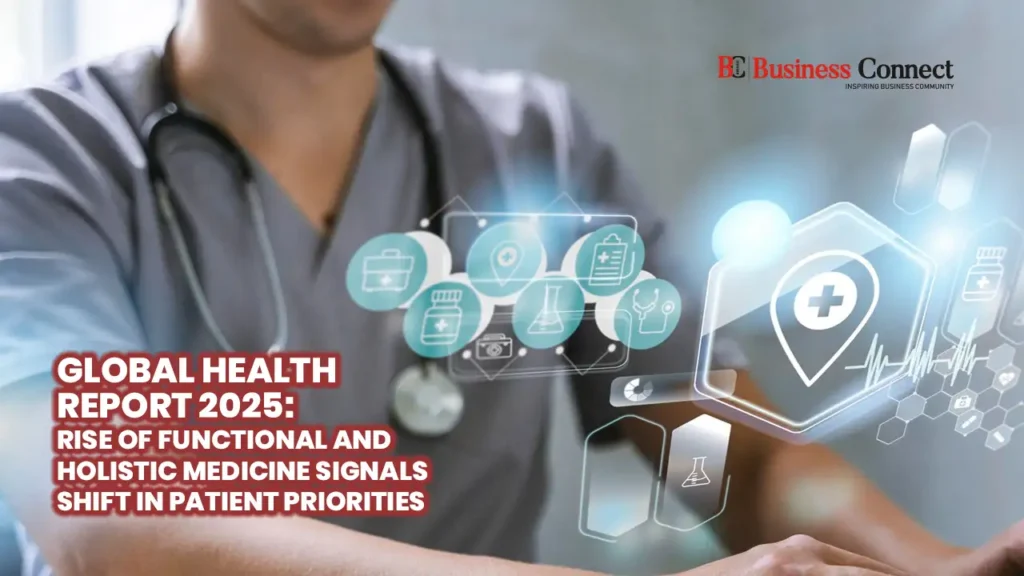Global Health Report 2025: Rise of Functional and Holistic Medicine Signals Shift in Patient Priorities
Around the world, healthcare systems are witnessing a notable shift in patient behavior. From major cities to developing regions, people are increasingly turning toward more comprehensive, whole-person approaches to health. Two models functional medicine and holistic medicine are emerging at the center of this global movement, prompting analysts to reassess how communities approach chronic illness, prevention, and long-term care.
This rise is not isolated to one country or culture. Reports from Asia, Europe, the Middle East, Africa, and South America indicate the same pattern: patients are searching for deeper explanations behind persistent symptoms and long-term health issues. As chronic conditions continue to rise, the demand for more personalized, investigative, and lifestyle-integrated healthcare has become visible across continent
Growing Global Interest in Root-Cause Care
Healthcare organizations in multiple regions report that patients increasingly seek medical consultations that go beyond surface-level symptom discussions. Many individuals now expect explanations about diet, stress, environment, hormonal patterns, gut health, and lifestyle factors that may influence disease.
This demand has fueled new attention around Functional Medicine, which looks at patterns and connections within the body rather than isolating symptoms into separate categories. The approach appears to resonate in countries where urbanization, processed diets, and high-stress routines have contributed to rising metabolic and inflammatory disorders.
Doctors in Southeast Asia note a rise in younger patients seeking clarity over digestive issues, fatigue, and hormonal problems. European clinics report a similar trend with patients requesting more detailed lab interpretations and lifestyle guidance, especially among women aged 25–45. In the Middle East, integrative health centers have seen a surge in people seeking preventive care rather than waiting for conditions to worsen.
Observers suggest the shift points to a universal desire: healthcare that feels thorough, connected, and personalized.
Conventional Medicine Still Essential, but Patients Want More
The move toward whole-person care does not imply a rejection of conventional treatment. Experts emphasize that standard medical systems remain indispensable for acute care, emergency intervention, infectious diseases, and surgical needs. Rather, the global conversation suggests that patients want a more balanced ecosystem—one where conventional medicine works in tandem with approaches that consider daily lifestyle, mental health, social factors, and long-term well-being.
Health researchers note that chronic conditions such as diabetes, thyroid disorders, autoimmune diseases, hormonal imbalance, and digestive problems now affect millions worldwide. Traditional 10-minute appointments, common in many countries, often leave little time to address lifestyle patterns or root causes. This gap has created space for new models to enter the global dialogue.
Digital Information Has Raised Public Expectations
With widespread access to medical content online, patients today arrive at consultations more informed than ever. Whether through scientific summaries, nutrition channels, or health forums, millions now understand terms like “inflammation markers,” “insulin resistance,” and “gut microbiome”—concepts that were once limited to academic circles.
- This expanded access has reshaped healthcare expectations:
- Patients expect detailed explanations, not quick reassurances.
- They want clarity about how lifestyle influences metabolic health.
- They are asking for broader diagnostic workups, not just basic tests.
- They expect discussions around mental health, sleep, and stress.
Functional and holistic frameworks, by design, align more closely with these evolving expectations, which may explain their international rise.
Holistic Medicine Gains Traction in High-Stress Regions
While functional medicine focuses on identifying internal imbalances, Holistic Medicine has gained traction for another reason: its emphasis on emotional well-being, stress, sleep, and environmental context.
Countries experiencing rapid economic growth and urban density—such as South Korea, the UAE, Singapore, and Türkiye—report growing burnout rates, sleep disturbances, and stress-linked health issues. Holistic approaches that integrate mind–body awareness, breathwork, mindfulness, and lifestyle stability have become increasingly relevant in these areas.
In Latin America, holistic practices are being incorporated into community programs addressing stress patterns among young professionals and students. African wellness centers report that holistic principles resonate with long-standing cultural traditions that view health as emotional, social, and spiritual—not only biological.
The global rise of mental health awareness appears to have strengthened this shift. Polls in multiple regions indicate that people now expect doctor–patient conversations to include emotional context alongside physical symptoms.
Hospitals and Clinics Begin Integrating Whole-Person Care
International health systems are gradually responding to the rising demand. In Europe, some hospitals have launched integrative medicine departments that blend conventional treatment with lifestyle-focused consultations. In parts of Asia, preventive health screenings now include evaluations of diet, sleep, and stress.
Several private clinics in the Middle East and Southeast Asia have expanded their teams to include nutritionists, stress-management coaches, and lifestyle counselors. Meanwhile, governments in countries such as New Zealand and Singapore have introduced public campaigns encouraging lifestyle-based disease prevention.
Analysts say this integration indicates a broader healthcare transition: one that recognizes chronic illness as both medical and lifestyle-driven.
A Pattern Seen Across Different Economies
Interestingly, the global interest in whole-person healthcare is not limited to wealthier nations. Reports from India, Indonesia, Kenya, Brazil, and the Philippines show that younger populations—especially those living in major cities—are actively seeking explanations for fatigue, gut problems, anxiety, skin conditions, and hormonal issues.
Community clinics in these regions note higher inquiries about food sensitivities, stress-related symptoms, and lifestyle-based treatment plans. Younger generations, in particular, appear to prefer doctors who take time to discuss sleep patterns, work stress, diet, and environmental exposures.
International health observers suggest that this represents a generational shift toward proactive, preventive care rather than reactive treatment.
Case Stories and Public Sharing Fuel the Trend
Around the world, individuals routinely share personal health experiences online—from overcoming chronic bloating to addressing hormonal imbalances or reducing anxiety through lifestyle adjustments. These narratives circulate through social platforms, spreading awareness and shaping public perception.
The impact is noticeable: people who once viewed chronic discomfort as “normal” now question whether underlying root causes can be identified and addressed. The shift from passive acceptance to active inquiry has become a defining tra
it of modern healthcare consumers.



